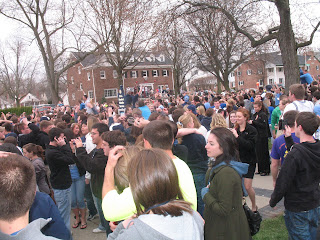
The following is an essay I submitted for the Butler Liberal Arts & Sciences 2010 essay contest. The contest posed the question:
New technologies and social media offer the public a myriad of options for reading and writing, and the sharing of opinions and experiences has never been easier or more immediate. But the immediacy and ease of publication is fraught with pitfalls and potential issues that provide new challenges for the next generation of readers, writers, and thinkers. Consider the place of your liberal arts education in this mix and write an essay in which you analyze how that education has better prepared you as a consumer of, contributor to, and critic of the texts that flow from new media outlets.
I sat in a boardroom at National Public Radio listening to news executive Dick Meyer talk about his career. His story sounded like other accomplished journalists I’d heard speak: he started in a traditional newspaper background. He rode the wave of technological changes and the Internet boom of the nineties -- and still maintained his journalistic foundation.
The interns sat around the table, attentive to Mr. Meyer’s words. We wanted insight into our future – a future that seemed potentially dismal in the midst of a recession and some of the biggest changes the journalism field has ever seen. Perhaps Mr. Meyer could impart wisdom that would unlock the keys to our success.
That’s when I asked him about the future of journalism.
“I don’t have the answers for you. It’s up to your generation to figure out how to do journalism.”
His answer was short, and it was not what I wanted to hear - at least, not at first.
As I thought about his answer, I realized that I have all the essential tools to figure it out how to adapt to new technologies. I’m not alone, either. My entire generation will move into adulthood - into this economy - with the combined skills and efforts that a four-year institution has helped us develop.
I glanced around at my colleagues. I was reminded of how diverse each of our educations was. All of us had traveled to Washington, D.C. from small private colleges, Ivy Leagues, Big Tens, and everywhere in between. We weren’t all journalism majors, either. We studied government, literature, gender, psychology and biology. We were a cornucopia of experiences, personalities and ideas, with a passion for storytelling.
Unless you’re a fortune-teller, there’s really no way to predict how society and technology will adapt to any changes headed our way. A seasoned journalist won’t have the answers for me. My professor won’t have the answers for me. But they’ve all given me a foundation for me to tackle the answers on my own.
In a future where the very foundations of media appear to be shaken, it’s important to remember that storytelling still has a role, no matter what the technology is. Marshall McLuhan so aptly put, “The medium is the message.” My storytelling skills will mature because of reporting classes, but also from a course on Islam, a seminar about doubt and reason, and even from a project researching housing costs in Indianapolis. It’s those courses - outside the periphery of my main studies - that will make my education that much richer.
The economy is uncertain, and so is the future of media. But no generation has ever known anything with absolute certainty. Instead, the past can aid us in making decisions in the present that will affect us in the future. Liz Coleman, president of Bennington College, said last February, “History provides a laboratory in which to see the actual as well as the intended consequences of ideas.”
We can thank our grandparents - our ancestors – for giving us that blueprint for the future. In the fabric of our society exist potential solutions for conflict, theories on ethical dilemmas – because others have tried it before we have. My History and Literature of Journalism class won’t tell me how to best reach audiences with the newest technology, but it will provide a critical foundation to equip me with tools for the future.
Coleman, a great innovator in preserving the liberal arts, said, “when making connections is of the essence, technology emerges with special intensity – but so does the importance of content.” If we incorporate something akin to Apple’s iPad into the classroom, we need to make sure that the content in that medium, whether news or literature or scholarly research – is still of substance.
No matter what vehicle will carry journalism into the future, we still need communicators with critical thinking skills, but we also need communicators who can also be good listeners. There are stories to be told. Lives to be chronicled. Imaginations to illuminate.
Back in the boardroom, I mused about my colleagues’ futures. From our diverse educations will spring forth communicators – men and women - in radio, television, and newspapers. It won’t stop there, either. One of the interns plans to attend law school, and another wants to start her own photography studio.
Mr. Meyer reminded us to keep an open mind and to never lose sight of the journalism’s foundation: the ability to observe, think critically and report the truth. That foundation, I believe, is what will sustain our society, whether informed by word-of-mouth, a smart phone or a message in a bottle.












